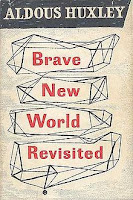 |
| Cover of Brave New World's 1st edition |
Just as a utopia is a literary work that
describes a perfect society, from the point of view of its author, a dystopia
is the description of a society where certain characteristics of the world in
which the author lives, which he considers unacceptable, are exaggerated and
carried to the extreme, with a satirical or denouncing intent.
The two world wars caused a feeling of
disillusionment in the West that gave rise to the two most famous dystopias of
recent history: Brave New World by Aldous Huxley
(written in 1931, published in 1932) and Nineteen-Eighty-Four
by George Orwell (written in 1948, published in 1949). These two works are
original in another sense: while other earlier dystopias (such as Samuel
Butler's Erewhon, 1872) were located in
remote places, such as the Antipodes, the two modern dystopias take place in
the future.
The feeling of oppression that seizes the
reader of these two novels is almost unbearable. In both cases, the very few
nonconformists in society are excluded: in the first, they
are banished to an island; in the second, the exclusion is only
temporary: the rebel is submitted to brainwashing
so as to destroy his spirit and turn him into a mental waste, raw material on
which the social planner can act, remodel and educate until he is recovered and
adapted to society. The two dystopias are horrible, but they have a very great
power of conviction and verisimilitude.
 |
| Cover of Brave New World Revisited's 1st edition |
Over a quarter century after the publication of
his novel, Aldous Huxley wrote an essay entitled Brave New
World Revisited (1958) where he reviewed the evolution of modern
society and compared it to the predictions of both dystopias, his and Orwell's.
In summary, his conclusions are the following:
- When he wrote Brave
New World, he thought it would take at least six centuries for his
predictions to be fulfilled. A quarter of a century later, he sees Western
society so advanced on the road to his dystopia, that he no longer thinks
the same, and foresees its consummation, at the latest, for the
twenty-first century.
- He believes Brave
New World will be much closer to reality than Nineteen-Eighty-Four,
because the latter foresees a world in permanent war, where, of course,
dissidents are forced to adapt through brute force. On the other hand, in
the society of Brave New World free thought can be eradicated by peaceful
means, by providing the members of society with alternatives such as free
sex, non-harmful drugs, and endless distractions.
Let us look at a few quotes:
To parody the words of
Winston Churchill, never have so many been manipulated so much by so few.
[Many people] are
normal only in relation to a profoundly abnormal society. Their perfect adjustment
to that abnormal society is a measure of their mental sickness. These millions
of abnormally normal people, living without fuss in a society to which, if they
were fully human beings, they should not be adjusted, still cherish "the
illusion of individuality", but in fact have to a great extent
deindividualized. Their conformity is developing into something like uniformity.
To give organizations
precedence over persons is to subordinate ends to the means. What happens when
ends are subordinated to means was clearly demonstrated by Hitler and Stalin
Human beings are a
good deal less rational and innately just than the optimists of the eighteenth century
supposed. On the other hand they are neither so morally blind nor so hopelessly
unreasonable as the pessimists of the twentieth century would have us believe.
 |
| Cover of 1984's first edition |
Huxley is right when he points that the present
society is promoting its own conversion into a termite nest, precisely by applying
the methods that he had indicated. But when he says that his vision is closer
to reality than Orwell’s, he forgets one of the latter’s predictions, which is
even closer to fulfillment. In Nineteen-Eighty-Four, the members of
that society undergo manipulation because they are under a permanent surveillance
expressed by a single phrase:
Big Brother is Watching
You
How is this surveillance performed? By means of
TV sets that cannot be disconnected, which permanently emit information about the
image and sound in front of them in the opposite direction to the usual. And
since there are TV sets everywhere, always connected, every human being remains
permanently under the eyes of those who are watching him.
What do we have today? Just the same, but in
the form of smartphones rather than TV sets. Have you noticed that it is
impossible to completely disconnect these devices, as the following suspicious hint
indicates? If you turn your smartphone off at night, when you turn it on in the
morning it has lost some of its battery charge. This was not the case with mobile
phones of the previous generation. They were not so smart, but could be
disconnected for weeks without losing battery charge. Nor does it happen with
personal computers, whose battery discharges very slowly while they are turned off.
The conclusion is obvious: the two dystopias of
the twentieth century threaten to become reality. What their two authors warned
us could happen, because they did not want it to happen, is about to happen.
What can we do? In Aldous Huxley own words:
Some of us still
believe that, without freedom, human beings cannot become fully human and that
freedom is therefore supremely valuable. Perhaps the forces that now menace
freedom are too strong to be resisted for very long. It is still our duty to do
whatever we can to resist them.
Manuel Alfonseca
No comments:
Post a Comment